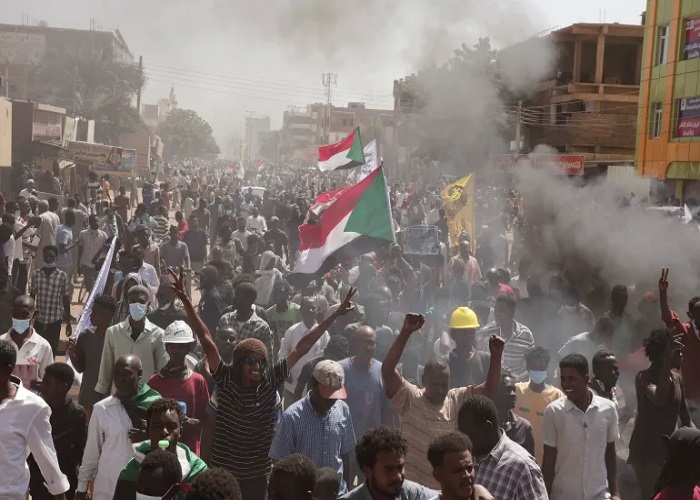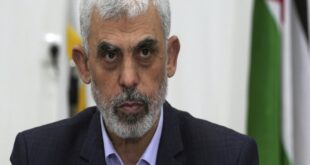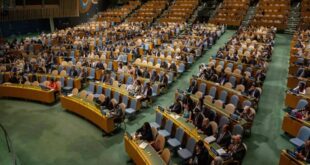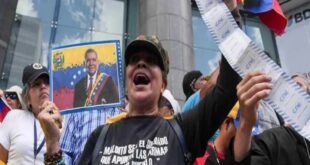
In early December 2022, after months of violence and uncertainty, the UN mission in Sudan announced the signing of a “framework agreement” between the country’s military and political parties.
The deal is aimed at ending a standoff between the two sides triggered by a coup in October 2021. A product of international mediation led by the US, the framework agreement supposedly provides for a two-year, “civilian-led” transition towards elections.
It is true that after the 2021 coup, which triggered a new episode of violent repression that already claimed the lives of some 120 protesters, Sudan desperately needs to find its way back to the path towards democracy.
Last month’s deal, however, will serve no purpose other than providing another lifeline to the actors responsible for the current political deadlock. The deal does not touch crucial issues like transitional justice, accountability and security sector reform, and thus, just like many others before it, fails to offer a blueprint for breaking the vicious cycle of democratic regression, violence and military intervention.
Since the ousting of Omar al-Bashir in 2019, Sudan’s international partners came up with countless deals, arrangements and frameworks that they claimed would end instability and bring the country closer to democratic governance. However, these efforts always centred on those already wielding power and ignored the aspirations of those truly responsible for the toppling of the al-Bashir regime: pro-democracy activists, and especially women and youths, who led the protests and spearheaded the movement for freedom in 2019.
Last month’s ‘framework agreement’ is unlikely to deliver democratic governance and stability.
It is time we understand that agreements between the military and political elites, however positive they may appear on the surface, will not help Sudan achieve peace and stability. What Sudan needs is a new political arrangement that centres and invests in the pro-democracy movement and works to help it build democratic leadership capacity.
I have firsthand experience with the many obstacles that prevent the pro-democracy movement from transforming into an effective vehicle for democratic governance.
I have been involved in political activism in Sudan since I was 16. In a closed, conservative society under an oppressive regime, engaging in political and public work as a young woman was not easy. I had two options: I could either involve myself in women’s organisations and platforms, which at the time were acting as subordinate to the male-dominated political organisations, or I could attempt to navigate my way into mainstream political parties and confront the many layers of power relations and anti-woman attitudes there.
I went with the latter option. Navigating Sudan’s political party culture characterised by repression, alienation, bullying and sexual harassment as a woman was difficult. On top of all this, I also had to deal with the stigmatisation of politically active women in society. Although it was a frustrating experience in many regards, it taught me a lot about how political organisations function in an impoverished, polarised country and what challenges they need to overcome to break the cycle of militarised governance.
When I eventually moved from party politics to civil society work, I found myself in a struggle of a different nature. In civil society spaces, connecting with the masses and agitating for change was perhaps easier, but we held even less official power. Despite the challenges, however, as an activist working for various civil society platforms, I was able to support other activists and collaborate with pro-democracy organisations and human rights defenders during critical times to help bring an end to al-Bashir’s oppression.
During the 2018-2019 protests in Sudan, an overwhelming majority of protesters on the streets were young, and more than 60 percent of them were women. Thus, women and young people rightfully believed they owned the uprising and viewed the revolution as a fruit of their labour. Despite in many ways leading the process of bringing down the Bashir regime, however, the women and youth of Sudan eventually had to yield to the leadership of weak and isolated political parties for several reasons.
Between the time I was part of Sudan’s political scene in the late 1980s and early 1990s to 2019, some 30 years have passed and so much has changed. By the time the revolution was under way and al-Bashir was on his way out, political parties had long lost any connection they had with the people and were solely interested in self-preservation. They had failed to engage with and accommodate in their policy plans the new waves of activism led by women, youths and minorities. Thus, in their attempts to lead the political transition after the revolution, they were doomed to failure.
The blame for this sad state of affairs is not on political parties alone. For decades, the international community neglected and undermined Sudan’s civilian political parties and movements while accepting the “strong men” with guns as their primary interlocutors.
Due to this lack of support and guidance, Sudan’s vibrant civil society successfully instigated regime change but failed to generate effective political leadership in the aftermath of the revolution.
And deals like the one signed last month, which serve to legitimise the military’s overinflated role in Sudan’s governance while giving the impression of democratic progress, further prevent the pro-democracy movement from developing political leadership capabilities. They provide the military and out-of-touch armed movements with legitimacy and make the dream of a truly civilian democracy even harder to achieve for activists.
Some suggest – given Sudan’s more than half a century of history of military control, economic fragility and the tendency for political violence combined with the current lack of a viable democratic leadership contender – the Sudanese should settle for military rule or a hybrid military-civilian government in the name of stability and security. Last month’s framework agreement also appears to be an effort in this direction.
However, the Sudanese people cannot and should not accept anything less than true democracy.
After holding on to the government for decades amid extreme polarisation, systemic corruption and civil wars, the Sudanese military and its allies from armed movements are in decay and in no state to rule over a country. Insisting on giving a role – any role – to the military in Sudan’s governance would prevent the country from moving on from its painful past and building robust democratic institutions and systems. Keeping military rule alive in any shape or form would only bring more suffering and instability to the country.
Sudan deserves an opportunity for democracy. We deserve a chance to move beyond military rule. What we need is not a “framework deal”, recycling broken promises, or even money. We need the international community to truly support our civil society so we can take the steps to finally return the military to its barracks for good and build truly democratic leadership for our country.
By Hala Al-Karib is an activist and research practitioner from Sudan – Aljazeera




 World Opinions Débats De Société, Questions, Opinions et Tribunes.. La Voix Des Sans-Voix | Alternative Média
World Opinions Débats De Société, Questions, Opinions et Tribunes.. La Voix Des Sans-Voix | Alternative Média




